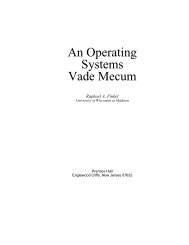Create successful ePaper yourself
Turn your PDF publications into a flip-book with our unique Google optimized e-Paper software.
Buffer Cache<br />
algorithm breada /* block read and read ahead */<br />
input: (1) file system block number for immediate read<br />
(2) file system block number for asynchronous read<br />
output: buffer containing data for immediate read<br />
{<br />
if (first block not in cache)<br />
{<br />
get buffer for first block (algorithm getblk);<br />
if (buffer data not valid)<br />
initiate disk read;<br />
}<br />
if (second block not in cache)<br />
{<br />
get buffer for second block (algorithm getblk);<br />
if (buffer data valid)<br />
release buffer (algorithm brelse);<br />
else<br />
initiate disk read;<br />
}<br />
if (first block was originally in cache)<br />
{<br />
read first block (algorithm bread);<br />
return buffer;<br />
}<br />
sleep(event first buffer contains valid data);<br />
return buffer;<br />
}<br />
Figure 74. Algorithm for Block<br />
"breada".<br />
Read Ahead<br />
If <strong>the</strong> second block is not in buffer cache, <strong>the</strong><br />
kernel instructs <strong>the</strong> disk driver to read it<br />
asynchronously.<br />
algorithm bwrite /* block write * /<br />
input: buffer<br />
output: none<br />
{<br />
initiate disk write;<br />
if (I/O synchronous)<br />
{<br />
sleep(event I/O complete);<br />
release buffer (algorithm brelse);<br />
}<br />
else<br />
if (buffer marked for delayed write)<br />
mark buffer to put at head of free list;<br />
}<br />
Figure 75. Writing a Disk Block Bach, "bwrite".<br />
If <strong>the</strong> write as asynchronous, <strong>the</strong> kernel starts <strong>the</strong> disk write but does not wait for <strong>the</strong> write to complete. The kernel<br />
will release <strong>the</strong> buffer when I/O completes.<br />
The kernel marks <strong>the</strong> buffer "delayed-write" and releases <strong>the</strong> buffer using "brelse". The kernel writes <strong>the</strong> block to<br />
disk before ano<strong>the</strong>r process can reallocate <strong>the</strong> buffer.<br />
Advantages and Disadvantages of Buffer Cache<br />
- use of buffers allows uniform disk access, (data is part of a file, an inode, or a super block) (simpler system<br />
design).<br />
- system places no data alignment restrictions on user processes doing I/O (because <strong>the</strong> kernel aligns data<br />
internally).<br />
- use of buffer cache can reduce <strong>the</strong> amount of disk traffic (increasing throughput and decreasing response time)<br />
("delayed write" avoids unnecessary disk writes) (amount of memory available for buffers).<br />
- buffer algorithms help insure file system integrity (serialize process access - preventing data corruption).<br />
- reduction of disk traffic (vulnerable to crashes that leave disk in an incorrect state).<br />
- use of buffer cache requires an extra data copy when reading and writing to and from user processes (for large<br />
amounts of data - slows down performance) (small amounts - improves performance - cache, delayed write).<br />
Summary<br />
The kernel uses least recently used replacement to keep blocks in buffer cache, assuming that blocks that were<br />
recently accessed are likely to be accessed again soon.<br />
The hash function and hash queues enable <strong>the</strong> kernel to find particular blocks quickly, and use of doubly linked<br />
lists makes it easy to remove buffers from <strong>the</strong> lists.<br />
The kernel identifies <strong>the</strong> block it needs by logical device and block number. "getblk" searches buffer cache for a<br />
block, if present and free, locks <strong>the</strong> buffer and returns it.<br />
If <strong>the</strong> buffer is locked, <strong>the</strong> requesting process sleeps until it becomes free.<br />
If <strong>the</strong> block is not in <strong>the</strong> cache, <strong>the</strong> kernel reassigns a free buffer to <strong>the</strong> block, locks it and returns.<br />
If kernel determines that is not necessary to copy data immediately to disk, it marks <strong>the</strong> buffer "delayed-write". A<br />
process is not sure when <strong>the</strong> data is physically on disk.<br />
186
















